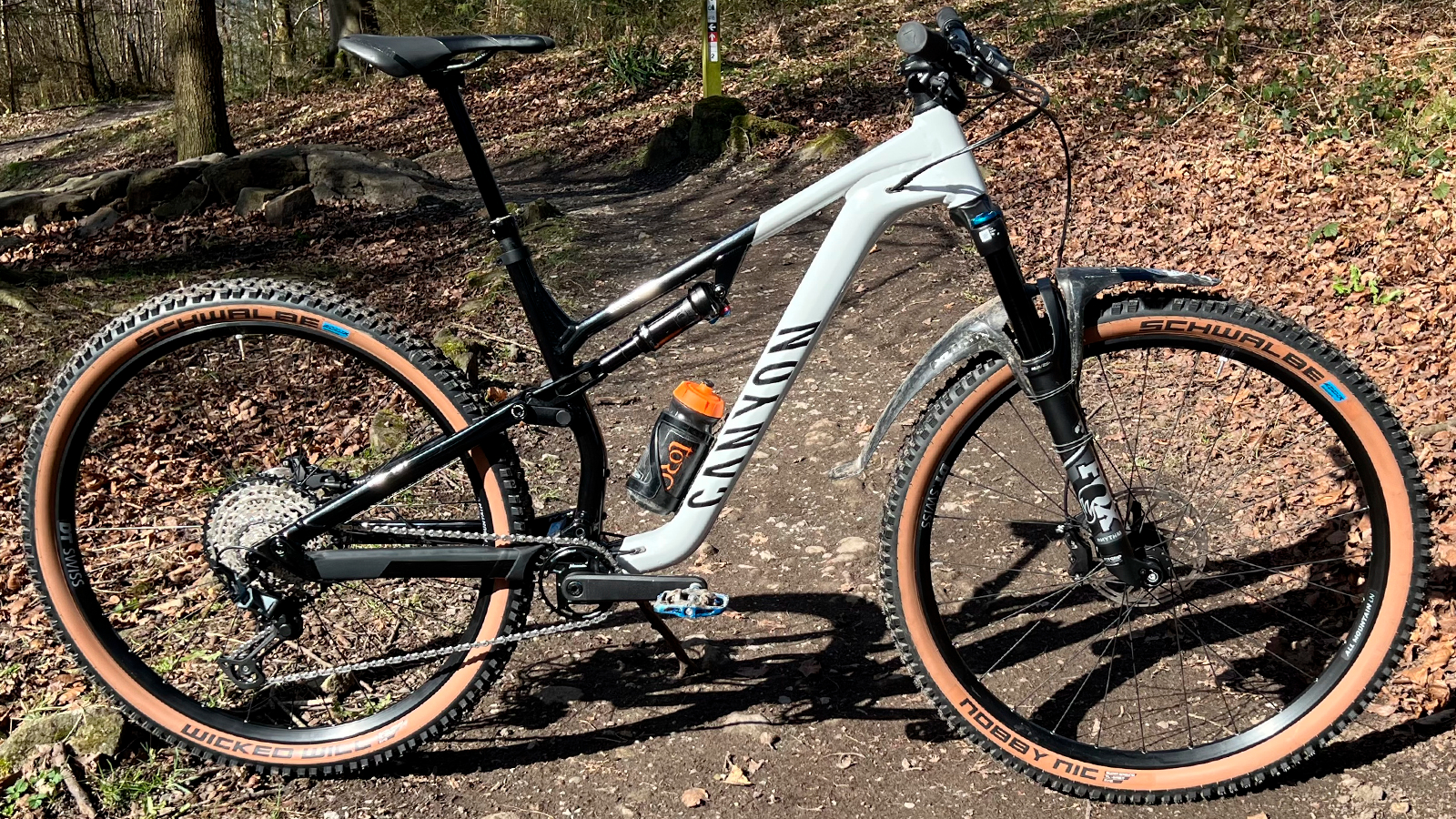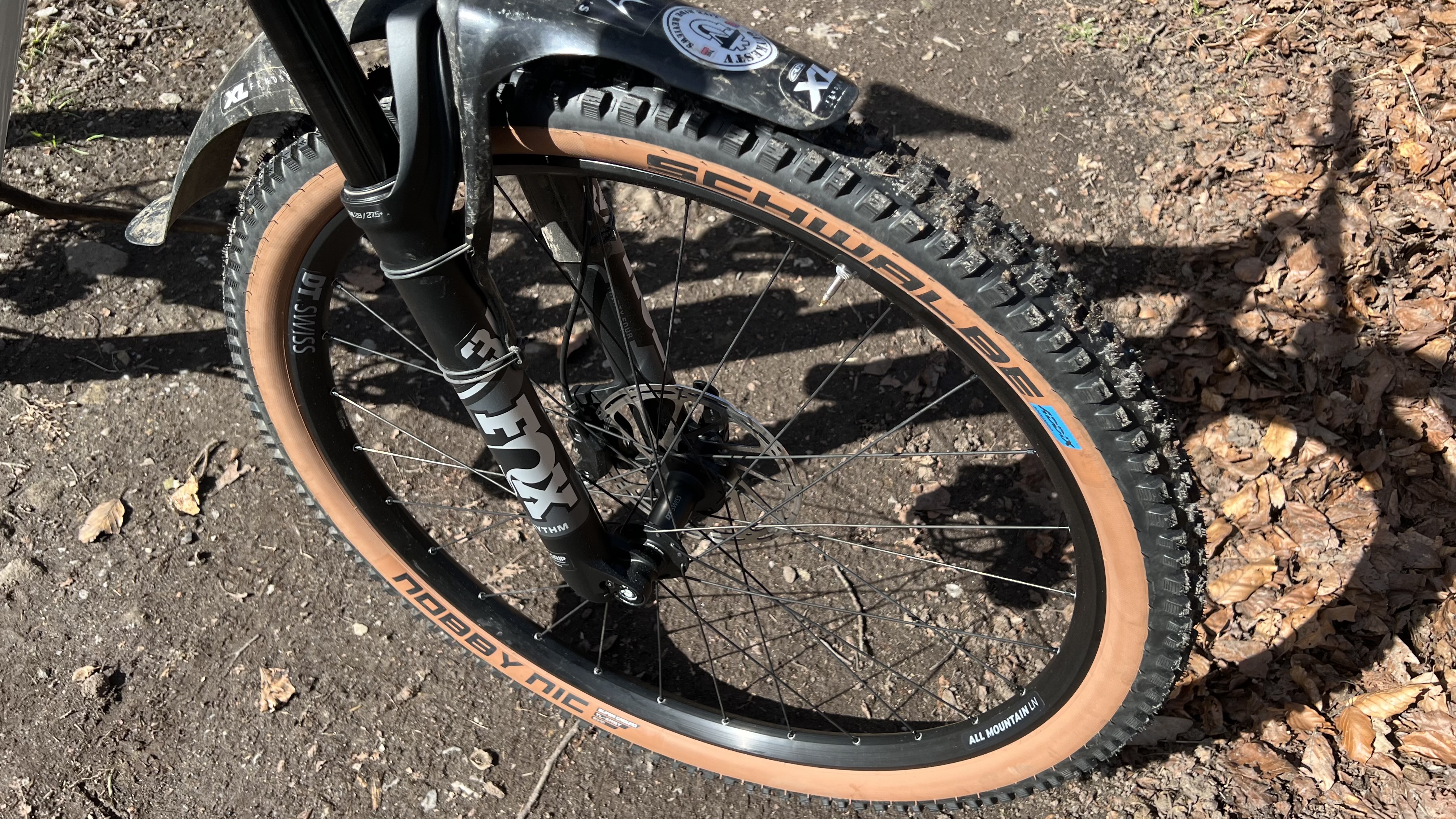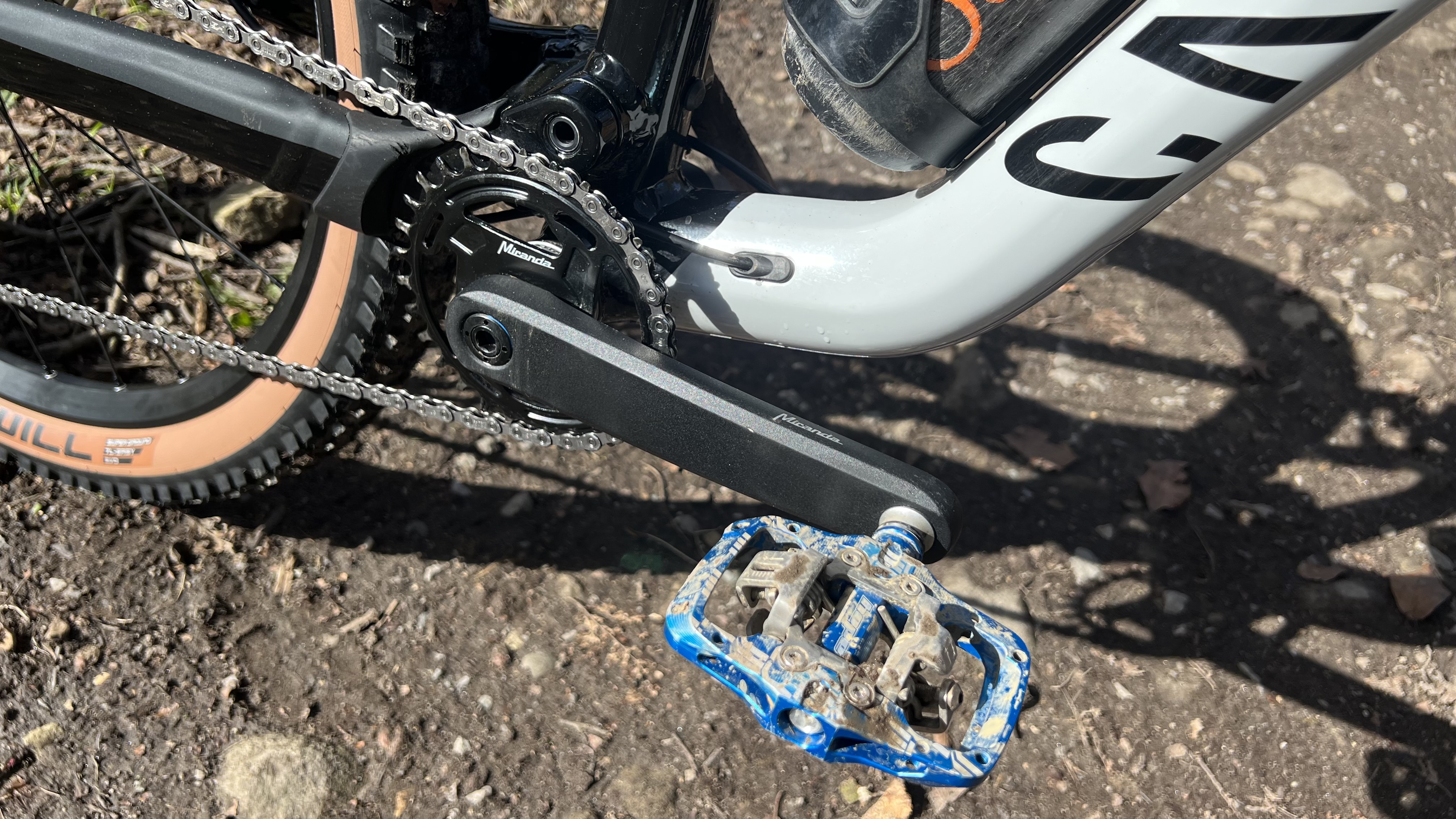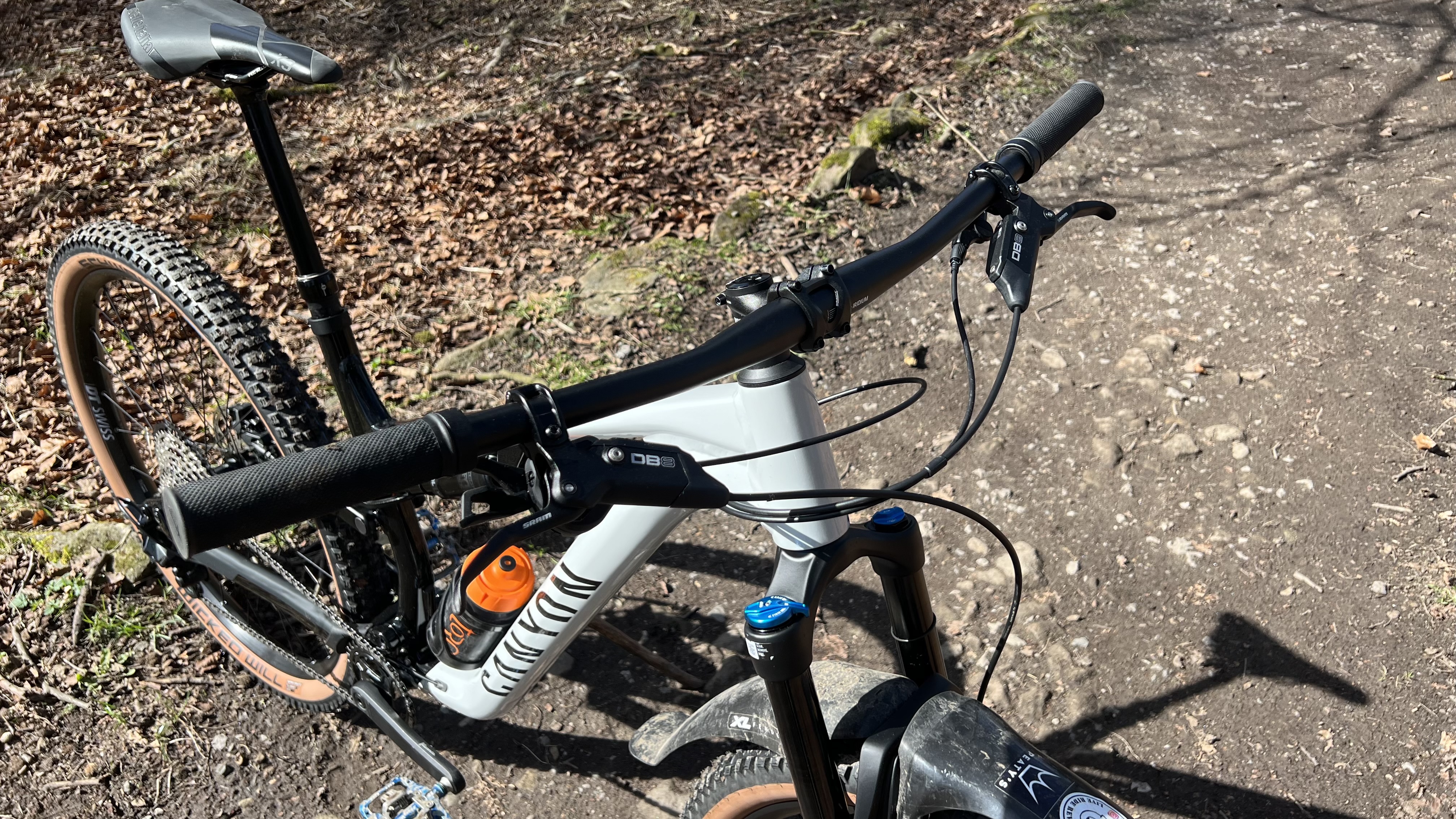
Canyon’s latest Neuron 140/130mm travel trail bike slides neatly into the rider/useage gap between their Lux Trail and the Spectral as a naturally fast and efficient all-rounder. The wide range of top value spec options on lightweight carbon fibre or (also lightweight) alloy frames cover a lot of budgets and this Neuron 6 is a real bargain. What I didn’t expect was what a poppy, playful and responsive extrovert it would be on a wide range of trails.

Design and geometry
While there are significant differences in geometry between the old Neuron and the new one, they look extremely similar. Top tubes are relatively long with a shared seam between sloped top tube and distinctively S bent downtube that bellies out well ahead of the BB. The shock is parallel with the top tube and driven by what look like identical driver yokes and fourth linkage between seat tube and seat stays. The seat tubes are still quite long but much shorter than before and you get a nicer moulded chainstay protector and neater semi-internal cable routing between mainframe and rear subframe. As well as the seat tube bottle position and twin height downtube bottle position of the previous Neuron, you also get an accessory mount behind the head tube. Canyon's neat Quixle built-in rear axle handle makes another welcome appearance too.
The frame is also around 200g lighter depending on size though with a medium chassis without shock coming in at a claimed 3.1kg, which isn’t far off a lot of carbon frames with less travel that also cost more than this whole bike. On that note, Canyon also do Neuron CF carbon bikes which save an average of 650g of frame weight over the alloy bikes and are still great value.
The alloy bikes still get the same well sealed, broad stance, main pivot, but internal controls enter the frame rather than the headset (which is a servicing blessing) and the seat tube is curved rather than straight. Neither material gets internal storage and Canyon haven’t bothered with a chain guide mount either which seems fair to me given the likely users. Both bikes have UDH hangers for SRAM Transmission compatibility, so you could upgrade the 6 with a drivetrain that costs more than the entire bike.
Where the Neurons have changed massively is geometry with a slacker 66-degree head angle, steeper 76.5-degree seat tube and a 20mm longer 472mm reach on the large I rode. While the angles don’t change between sizes, XS and S sizes use 27.5in wheels while M through XL run on 29in wheels with a longer rear end on the 29ers to fit the bigger wheels in. There’s also a ‘Young Hero’ youth model that’s effectively XXS.

Components and build
There are 11 Neuron models across carbon and alloy, youth, women's and standard bikes. The 6 is the second on the rung above the Deore and RockShox Recon fork equipped Neuron 5 at £1,849. Spending the extra £400 on the 6 gets you Shimano SLX gears with a Deore chain and Miranda cranks turning in a Race Face bottom bracket.
You get Fox suspension too with a 34 Rhythm fork and Float DPS Performance damper both of which have compression and rebound adjust. DT Swiss AM LN 370 wheels are only available on complete bikes but the 370 hubs are very well proven and the 30mm internal width rim is tubeless ready. The tires are a highlight too, not just because of the fashionable ‘bronze’ sidewalls but because the Nobby Nic and Wicked Will combo in Addix SpeedGrip compound are seriously rapid and lively feeling tires albeit with just about adequate, not amazing traction.
Brakes are the ugly but effective mineral oil filled SRAM DB8s and the cockpit and dropper are Canyon’s in-house ‘Iridium’ brand. While 14.6kg might sound heavy, to put it in perspective, Trek’s 120mm travel Top Fuel 8 XC bike is less than 200g lighter and £1,500 more expensive.

Ride, handling and performance
A lot of those cost savings come because Canyon are sold direct, but that also means limited opportunity to try fit before you buy, so sizing is always a common question. According to Canyon’s guide, at 180cm I could use either a medium or large frame. Choosing large meant minimum saddle height is around 725mm from the BB which only gave me 20mm shaft showing, but as the reach actually measure 8mm less than claimed I was glad I’d gone for the bigger size. Even with an almost flat bar that made the front end feel tall though so I’d definitely suggest removing some headset spacers and maybe flipping the stem upside down if you want a more grounded feel. In contrast, the Fox fork needs more pressure than stated on the back of leg setup panel and half a turn of compression adjustment to stop it diving into it’s travel too easily. The rear shock has a very light compression and rebound tune so you’ll need to calm that down to taste with the blue lever and red dial respectively.
That light damping tune and progressive shock feel from super plush to ‘catch’ ramp up very late in the stoke are at the heart of the poppy and lively ride of the Neuron though. In fact, it’s so poppy and lively, it can be a proper handful on more hectic trails until you get the damping dialed in and you’ll still sometimes get more bounce or kick from the back end under power than normal. If you’re regularly sending it off drops over a meter onto hard landings you’ll probably want to add more progression with a bigger volume spacer, but as it comes it’ll stick anything under that without any drama or random ricochet.

You’ll want to flick the ‘pedal’ lever across if you’re straining a gear out of the saddle on a smooth climb too. It’s settled enough to feel efficient at a steady seated tempo though despite the initial travel feeling super supple and sensitive as though it’s running a bearing mounted trunnion shock.
The head angle, short 50mm stem and relatively narrow bars give a very quick and responsive steering feel that lights up the relatively stable wheelbase and rear center numbers. The tall head tube and long seatpost drop mean it can still be trusted more than I anticipated down steep, sloppy rut snakes and it’ll hook a catch berm pretty hard without high siding you too. While they’re not pretty, the SRAM brakes didn’t let it down on testing descents either and the DT Swiss wheels took some seismic blows in their stride when things got bouldery.
While they need care in the wet/steep/high load situations, the fast rolling, buoyantly bouncy tires give the Neuron way more pep and acceleration/climbing enthusiasm than you’d expect for the near 15kg weight once pedals are fitted. They also hold speed extremely well, with the easy mid stroke movement of the suspension stopping the Neuron hanging up or stalling on roots, rocks or other momentum murdering sections.

Verdict
Breaking down performance into component parts can risk losing the bigger picture so what I really want to emphasize is that the Neuron 6 was way more lively, responsive and easily rapid than I expected. Not just for an affordable alloy bike, but even compared to the shorter travel, triple/quadruple the price super bikes I was lucky enough to spend Christmas testing. That translates into a bike that’s an absolute blast on flowy or techy singletrack but still happy galloping long distances with ease and won’t give you wet shorts if things suddenly get steep and sketchy. Kit value and practical function are excellent too, as long as you don’t mind your bike arriving in a box and you’re fine bolting/strapping kit onto the frame rather than stuffing it inside. The fact there’s even a youth option is excellent considering economy brands often restrict size ranges to the most popular and you even get a neat tool kit and shock pump with the bike.
But at the risk of overplaying the point, it’s the sheer sense of a bike that’s enjoying being ridden as much as you’re enjoying riding it that’s the outstanding aspect of the Neuron. Especially as it’s something Canyon have sometimes lost from their bikes recently by making them so controlled and damped down they can sometimes feel too serious for less challenging trails.
Tech specs: Canyon Neuron 6
- Discipline: Trail
- Frame material: 6061 alloy
- Fork: Fox 34 Float Rhythm, 140mm travel
- Shock: Fox Float DPS Performance 127mm travel
- Size: XS, S, M, L (tested), XL
- Weight: 14.63kg
- Wheel size: 29in
- Chainset: Miranda Delta 30T, 170mm crank with Miranda bottom bracket.
- Mech: Shimano SLX 12-speed
- Shifter: Shimano SLX 12-speed
- Cassette: Shimano SLX 12-speed 10-51T
- Brakes: SRAM DB8 hydraulic disc brakes with 180mm rotors
- Tires: Schwalbe Nobby Nic and Wicked Will Addix Speedgrip Bronze rear
- Wheels: DT Swiss AM LN 370
- Bar: Iridium 760mm
- Stem: Iridium 50mm
- Seatpost: Iridium 170mm dropper
- Saddle: Selle Italia X3
- Price: $2,599 / £2,249 / €2,299 plus shipping
- Available from: canyon.com







